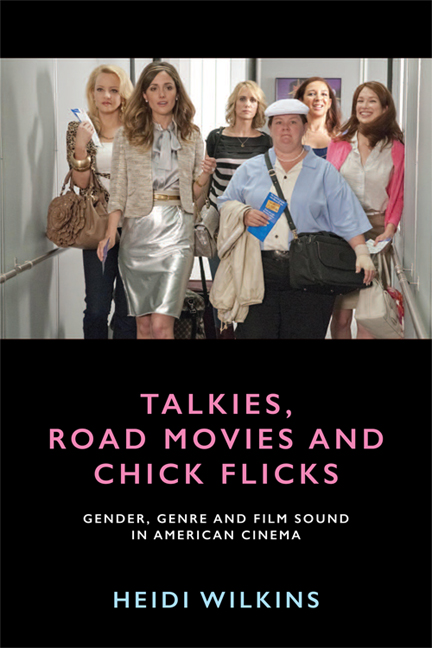Book contents
- Frontmatter
- Contents
- Acknowledgements
- Introduction
- 1 Talking Back: Voice in Screwball Comedy
- 2 All That Jazz: The Diegetic Soundtrack in Melodrama
- 3 The Alienated Male: Silence and the Soundtrack in New Hollywood
- 4 Brothers in Arms: Masculinity and the Vietnam War Movie
- 5 Subversive Sound: Gender, Technology and the Science Fiction Blockbuster
- 6 Girl Talk: The Postmodern Female Voice in Chick Flicks
- Conclusion
- Bibliography
- Filmography and Other Sources
- Index
4 - Brothers in Arms: Masculinity and the Vietnam War Movie
Published online by Cambridge University Press: 05 August 2016
- Frontmatter
- Contents
- Acknowledgements
- Introduction
- 1 Talking Back: Voice in Screwball Comedy
- 2 All That Jazz: The Diegetic Soundtrack in Melodrama
- 3 The Alienated Male: Silence and the Soundtrack in New Hollywood
- 4 Brothers in Arms: Masculinity and the Vietnam War Movie
- 5 Subversive Sound: Gender, Technology and the Science Fiction Blockbuster
- 6 Girl Talk: The Postmodern Female Voice in Chick Flicks
- Conclusion
- Bibliography
- Filmography and Other Sources
- Index
Summary
Following the New Hollywood era, in which alternative depictions of masculinity began to pervade the screen, came a body of films that explored America's involvement in the Vietnam War. During the conflict itself, Hollywood produced only one film that dealt directly with Vietnam, The Green Berets (1968). The film starred John Wayne leading a team of Special Forces troops in a fight against the Vietcong. It was not well-received by critics and modern cinema audiences saw Wayne's portrayal of the ultra-patriotic Colonel Mike Kirby as wholly outmoded, and, according to David Savran, as ‘embarrassingly out of place’. The film's pro-war agenda did not sit well with the American public, many of whom were strongly opposed to US involvement in the Vietnam conflict.
The general perception of Hollywood at this time is that studios were reluctant to make films about Vietnam because the war was so publicly contentious. Furthermore, the industry itself was still in economic crisis and attempting to appeal to younger viewers, many of whom were largely opposed to America's involvement in the war. Drawing on Tom Englehardt to explain the impact of the Vietnam War on the American public, Steve Neale notes that the ‘defeat and withdrawal from Vietnam in the early 1970s challenged the tenets of America's “victory culture” [and] ensured that its participation in the war remained deeply controversial’. It was, therefore, a complex task to find effective ways in which to portray this conflict. The first solution was found in the mode of allegory. At this time, a number of successful films made attempts at portraying the underlying anxieties about the conflict through allegorical depiction and indirect association. For example, The Wild Bunch (1969) portrayed an unwinnable struggle between a group of ageing outlaws and a band of bounty hunters, Deliverance (1972) depicted a struggle between four Southerners on a river excursion and a group of in-bred folk living in the wilderness, and Taxi Driver (1976) featured the unstable, maladjusted war veteran Travis Bickle (Robert De Niro) struggling to re-adjust into civilian society.
- Type
- Chapter
- Information
- Talkies, Road Movies and Chick FlicksGender, Genre and Film Sound in American Cinema, pp. 99 - 124Publisher: Edinburgh University PressPrint publication year: 2016



